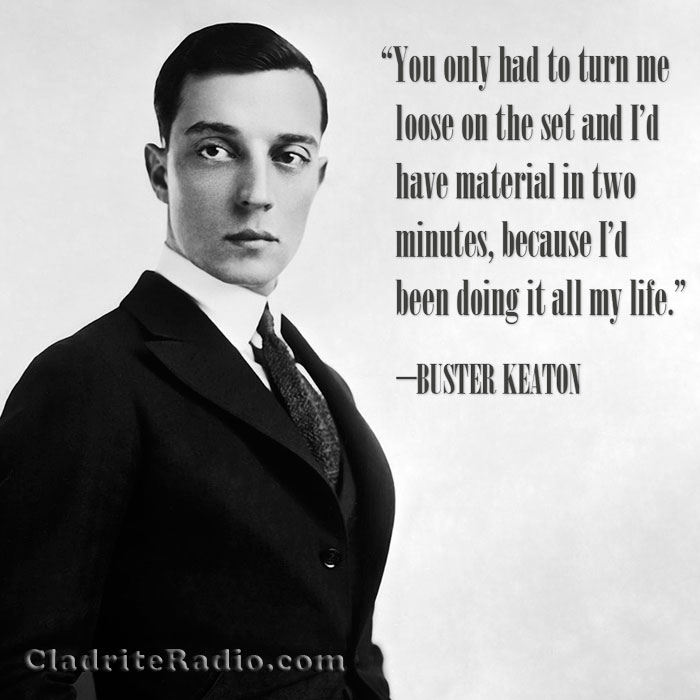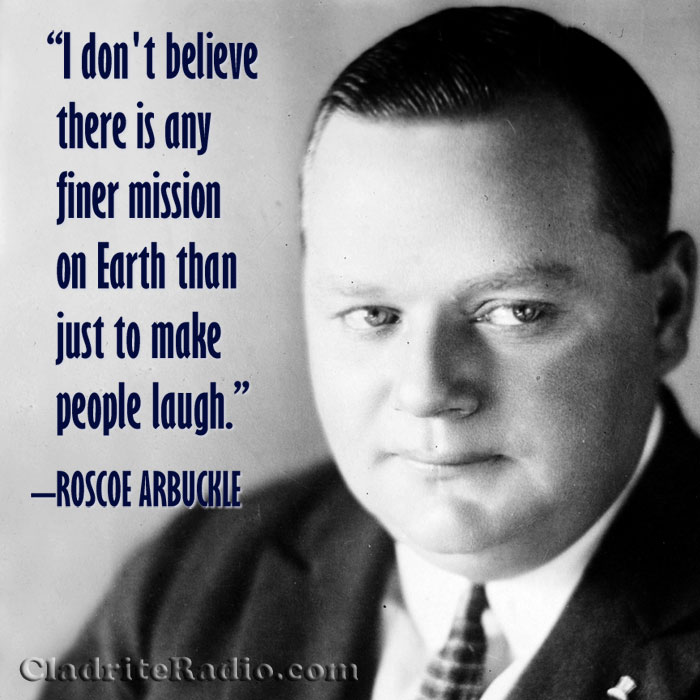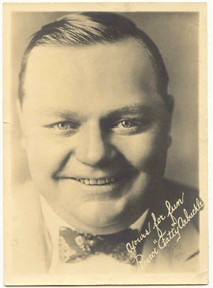Here are 10 things you should know about Roscoe “Fatty” Arbuckle, born 133 years ago today. In his career, he experienced both dizzying heights and tragic depths.
Tag: Virginia Rappe
Happy 121st Birthday, Buster Keaton!
The wonderful Buster Keaton was born Joseph Frank Keaton 121 years ago today in a figurative trunk that just happened to be situated in Piqua, Kansas. Keaton ranks right up there with the Marx Brothers in our esteem, and as has surely been established by now, that’s saying something. Here are 10 BK Did-You-Knows:
- Keaton was born into a theatrical family, as his father owned a traveling show with Harry Houdini called the Mohawk Indian Medicine Company that featured performances and sales of patent medicine.
- Buster followed five other generations of Keaton men named Joseph (though the middle names varied).
- The story goes that when Keaton was a toddler, Houdini witnessed him take a spill down a flight of stairs and emerged unharmed. “That was a real buster,” the legend has Houdini saying of the fall, and thus was a lifelong nickname born (unless the story is apocryphal, which is certainly possible).
- By age three, Buster was a performer in an act called The Three Keatons that saw his mother playing saxophone and Buster and his father engaging in knockabout horseplay for humorous effect (mostly, the elder Keaton tossed his young son about in acrobatic fashion, which was surely laid a solid groundwork for some of the stunts Buster would later perform on screen). The act frequently came under scrutiny because of laws that prohibited the use of child actors in vaudeville performances and also because of concern on the part of the authorities for Buster’s safety, but the younger Keaton was adept at avoiding injuries, telling The Detroit News in 1914, “The secret is in landing limp and breaking the fall with a foot or a hand. It’s a knack. I started so young that landing right is second nature with me.”
- As a child, Keaton lost most of his right index finger to a run-in with a clothes wringer.
- Because of his father’s alcoholism, Keaton and his mother moved to New York City around 1916, where Buster first broke into films.
- Keaton served with the 40th Infantry Division during World War I. While on active duty, he suffered an ear infection that left his hearing permanently impaired.
- Keaton’s film career was launched after meeting Roscoe Arbuckle at the Talmadge Studio on East 48th Street in NYC. They would go on to make 14 shorts together and remained fast friends, even after Arbuckle was accused of causing the death of actress Virginia Rappe (he was eventually exonerated).
- Keaton was an avid fan of the game of baseball, playing it at every opportunity.
- Keaton’s move to MGM in the early talkies era was financially rewarding, but proved to be a detriment to his work, as the studio’s overly hands-on approach didn’t fit Keaton’s seats-of-the-pants style of filmmaking. The loss of control over his films drove Keaton to drink, and by 1932, MGM had fired him (the studio would hire him back some years later for a fraction of his original salary). His third wife, Eleanor, eventually helped him get his drinking under control and he began working as a gag man for other film comics. He continued to work, both behind and in front of the camera, until his death in 1966, but he never again equaled his greatest, pre-MGM successes.
Happy birthday, Buster Keaton, wherever you may be!

Happy 129th Birthday, Roscoe Arbuckle!
Roscoe Arbuckle was born 129 years ago today in Smith Center, Kansas. Few actors have risen as high nor fallen so swiftly as far (and unjustly so) as Arbuckle, and it’s a little bit heartbreaking, even all these years later, to think that he died so soon after being exonerated of false charges, that he never had the opportunity to enjoy the triumphant comeback he was so richly due. We won’t address here the legal case that did in Arbuckle’s career—you can readily find that sad, sordid information elsewhere—but we sorely regret that he was subjected to such ill-founded accusations. He deserved better.
What’s more, we owe Arbuckle a debt of gratitude not only for his own fine work in pictures, but for recognizing genius and spotlighting Buster Keaton in a few of his films. Perhaps Keaton would have found his way to cinematic stardom, anyway, but perhaps not, without that boost from Arbuckle.
Happy birthday, Mr. Arbuckle, wherever you may be. We’ve shared very few quotes here at Cladrite Radio with which we more heartily agree than yours.

It’s “Free Roscoe” Friday
 March 24th marks the 125th anniversary of the birth of the great Roscoe Arbuckle. And to celebrate, Cladrite Radio is giving away not one, not two, but three copies of The Forgotten Films of Roscoe “Fatty” Arbuckle, a four-disc DVD boxed set that features 32 restored comedy classics.
March 24th marks the 125th anniversary of the birth of the great Roscoe Arbuckle. And to celebrate, Cladrite Radio is giving away not one, not two, but three copies of The Forgotten Films of Roscoe “Fatty” Arbuckle, a four-disc DVD boxed set that features 32 restored comedy classics.
In the 1920s, Arbuckle, once as popular as any comedy performer of the silent era, experienced a fall from grace that was precipitous and, sadly, unjust.
Born in Smith Center, Kansas, in 1887, Arbuckle, one of nine children, weighed in at 13 pounds. Because both his parents were slim, his father was convinced he was, well, not his father, and he named his son Roscoe after the philandering local politician he was sure had cuckolded him.
As a child, Arbuckle enjoyed performing in theatres as a singer, but when his mother died when he was 12, his father disowned him and Roscoe was forced to do odd jobs in a hotel. A professional singer heard Arbuckle singing in the lobby and encouraged him to enter an amateur talent show. Arbuckle used a spry bit of acrobatics to avoid the hook that was headed his way during that competition and in the process won the audience over, taking first prize.
That led to a vaudeville career, and in 1909, he signed on with the Selig Polyscope Company, appearing in one-reelers until 1913. He then moved briefly on to Universal Pictures before rising to stardom on the strength on his work in Mack Sennett‘s popular Keystone Kops shorts.
In 1914, Arbuckle signed with Paramount for the unheard-of sum of $1,000 a day and was afforded complete creative control over his movies. But excessive drinking and health issues led to an addiction to morphine, and he was in danger of losing a leg to a carbuncle. He eventually recovered, keeping his leg in the process, and launched his own production company, Comique, in partnership with Joseph Schenck. The company proved a success, but in 1918, Arbuckle transferred ownership to Buster Keaton so that he might sign a three-year, $3-million pact with Paramount.
Arbuckle had a big impact on a number of other memorable careers. He mentored Charlie Chaplin after the Brit signed with Keystone, and it was from Arbuckle that Chaplin borrowed the idea of having his Little Tramp character wear baggy pants, an undersized hat, and boots.
Arbuckle also gave Keaton his first work in motion pictures in the 1917 effort, The Butcher Boy. The two went on to be a successful and popular team until Arbuckle departed for Paramount.
Read More »
